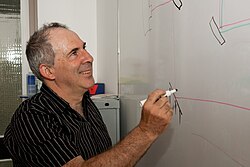Lev Vaidman
| Lev Vaidman | |
|---|---|
 |
|
| Born |
September 4, 1955 Leningrad, Soviet Union |
| Residence |
Israel Russia |
| Fields | Physics (theoretical) |
| Institutions | Tel Aviv University |
| Alma mater |
Hebrew University of Jerusalem |
| Known for | Research of quantum mechanics and quantum information, Elitzur–Vaidman bomb-tester |
Hebrew University of Jerusalem
Lev Vaidman (born September 4, 1955) is a Russian-Israeli physicist and Professor at Tel Aviv University, Israel. He is noted for his theoretical work in the area of quantum teleportation and the Elitzur–Vaidman bomb-testing problem in quantum mechanics. He was a member of the Editorial Advisory Board of The American Journal of Physics from 2007 to 2009. His work and the experiments which they have inspired have lent support to the many-worlds interpretation of quantum physics. In 2010, their experiment was chosen as one of the "Seven Wonders of the Quantum World" by New Scientist Magazine.
He was twice among the winners of the All-Soviet high school students Physics Olympiad (first place in 1971 and second place in 1972), and in 1972 scored 4th in the International Physics Olympiad in Bucharest. Vaidman emigrated with his family to Israel at the age of 18. Prior to that, he studied for one year at Saint Petersburg University (then Leningrad University).
This thought experiment, subsequently conducted in the lab, is an example of interaction-free measurement (IFM). IFM is the detection of the property of an object or its presence without any physical interaction between the observer and the object. Obtaining information from an object in such a manner is paradoxical.
The bomb tester works by employing an interferometer. When a photon is fired into the device, it encounters a half-silvered mirror positioned so as reflect the photon at a ninety-degree angle. There is a 50-50 chance it will be reflected or pass through. Due to the quantum properties of the photon, it both passes through the mirror and is reflected off of it.
...
Wikipedia
